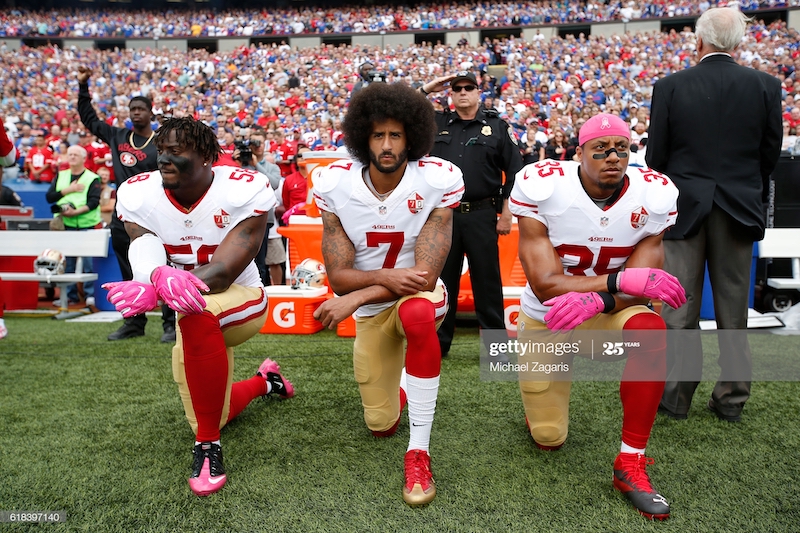It has been four years since Colin Kaepernick took a knee. His fight, our fight, was against the heinous experiences African Americans face from the same institution that is supposed to protect them. Kaepernick not only highlighted the institutionalized police brutality and racial discrimination in America, he laid out a blueprint for athletes who would also like to join the cause.
Despite the urgency and importance of his cause, he was ostracized. The NFL community did not want to understand why he kneeled, and instead took it as a personal attack against their flag and military. Now, America is on fire. Looting and violence is not the answer, but apparently, neither was a peaceful protest from a black man with a platform.
In the last few weeks, Ahmaud Arbery, Breonna Taylor and most recently George Floyd lost their lives to the hands of institutionalized racism. They lost their lives by the same sword Kaepernick tried to use his platform to fight against. The fire that burned within Kaepernick back in 2016, now has the country and the world alight.
It is comforting though, that despite the era of performative activism we live in, this moment has enabled young African-American football, as in soccer, players to use their platform, following in the footsteps of Kaepernick, to stand up for their people and the injustices they face every day.
Weston McKennie
Football is back in full swing in Germany, with the Bundesliga continuing behind closed doors. With global sport still largely shut down due to the COVID-19 pandemic, the eyes of the global footballing community are entirely focused on the events of the Bundesliga. Schalke 04’s American midfielder, Weston McKennie made sure to take full advantage of the exposure. In Saturday’s loss to Werder Bremen, McKennie was in the headlines not for his performance, but for the armband he proudly wore. Four simple words were emblazoned across his bicep, “Justice For George Floyd”.
Despite his noble intentions to highlight the injustices back home, McKennie told Forbes that the referee asked for him to remove the armband mid-game. He refused.
“I was like, 'I’m not taking it off'. There’s a rule in the league that you can’t make political statements. But I mean if you really, really, look at this as a political statement, then I don’t know what to tell you."
DeAndre Yedlin
Newcastle United and USMNT fullback DeAndre Yedlin, took to Twitter to share a personal text message he received from his grandfather. It was in response to the unrest back home. His grandfather was thankful that his grandson does not currently live in America.
Yedlin left his home country in 2014, to chase his dreams of playing in the bright lights of the Premier League. But the fear that his grandfather expressed, is shared by many African American parents. Black families in America dread the day their loved one does not return home, with the worry about being gunned down in the streets.
Yedlin tweeted the following:
"He was born in 1946, lived through the civil rights movement lived through some terribly racist times in U.S history, and now 70 years later he STILL fears for the life of his black grandchild, in the country he and his grandchild were born in, in the country his grandchild represents when he plays for the United States,”
Zack Steffen
The 25-year-old Fortuna Dusseldorf and USMNT goalkeeper has been amongst the most vocal players in Germany about the situation happening back home. This week he launched Voycenow, a social media page which he will use to speak on social issues. Voycenow is a safe community for equality and social justice.
He took to Instagram to talk about how his platform and the power of social media can influence a change that should have happened years ago.
“I proudly defend my team’s goal on the field, and work hard to ensure I am representing my country in the best light off the field as well, but what does it mean when the very nation I protect the goal for won’t protect its citizens who look like me?
“If I’m going to wear the U.S flag. I need to know that it stands for something worth defending.”
This generation of athletes learnt from figures like Kaepernick, that silence does more harm than good. They have recognized the power of their platform.
But for the rest of us, being a voice for the voiceless is not just one post, one donation, or one documentary. It’s a constant fight of continuing to have conversations around the dinner table and at the pub educating those who don’t understand the value of black life around the world and how easily it can be taken with little to no consequence.









































